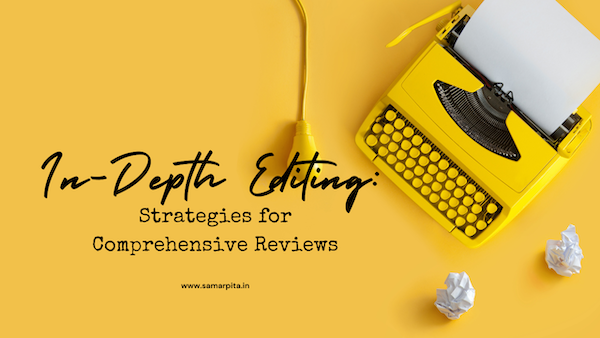Editing is an essential part of the writing process, as it allows you to refine and improve your work. However, there are different types of editing, and each serves a specific purpose. In-depth editing, also known as comprehensive editing, is the most thorough type of editing, and it involves reviewing your work at a deep level to ensure that it is clear, well-organized, and error-free.
In-depth editing can be a challenging task, as it requires a significant investment of time and effort. However, it is also incredibly rewarding, as it can help you to produce a high-quality piece of writing that will engage and impress your audience. In this blog post, we will discuss some strategies that you can use to conduct a comprehensive review of your work.
Also Read: Should you hire a professional editor to improve your manuscript?
-
Take a Break
Before you start editing your work, it is essential to take a break from it. This will allow you to approach your writing with fresh eyes and a clear mind. You can take a break for a few hours, a day, or even a week, depending on your schedule and preferences. During this time, you can work on other projects, spend time with friends and family, or engage in activities that you enjoy.
-
Read Your Work Aloud
One effective strategy for in-depth editing is to read your work aloud. This will help you to identify awkward or unclear sentences, grammatical errors, and other issues that might be difficult to spot when reading silently. As you read, pay attention to the flow of your writing, the pacing, and the overall tone. If you find yourself stumbling over certain phrases or struggling to understand a particular sentence, make a note of it and revise it later.
Also Read: Building A Writing Routine
-
Review Your Structure
In-depth editing also involves reviewing the structure of your writing. This includes the organization of your ideas, the coherence of your arguments, and the logical flow of your writing. Consider whether your introduction effectively introduces your topic, whether your paragraphs are well-organized and unified, and whether your conclusion effectively summarizes your main points. You may also want to consider the use of transitions and other devices to help guide your reader through your writing.
-
Check Your Grammar and Spelling
While in-depth editing involves more than just checking for grammar and spelling errors, these are still important aspects of the editing process. Use a spellchecker to identify any misspelled words, and review your writing for common grammatical errors, such as subject-verb agreement, pronoun use, and punctuation. Pay particular attention to common mistakes, such as confusing homophones (e.g., “they’re” vs. “their” vs. “there”) or using apostrophes incorrectly.
-
Seek Feedback
Finally, it can be helpful to seek feedback from others during the in-depth editing process. This can be a trusted friend, a writing group, or a professional editor. Ask them to review your work and provide feedback on areas that need improvement. This can help you to identify blind spots in your writing and gain a fresh perspective on your work.
Also Read: Who Are Ideal Book Reviewers And How Can You Find Them?
In conclusion, in-depth editing is an essential part of the writing process, as it helps you to refine and improve your work. By taking a break, reading your work aloud, reviewing your structure, checking your grammar and spelling, and seeking feedback, you can conduct a comprehensive review of your writing and produce a high-quality piece that will engage and impress your audience.
This post is part of #BlogchatterA2Z challenge
***
If you are looking for an excellent manuscript editor, someone to create content for your business, or an expert to help build your personal or professional brand on social media, then look no further and connect with me at editor@samarpita.in I can be followed on instagram at @samarpita and on twitter at @samarpitadotin.
***********
Read my ebook WRITE. EDIT. PROMOTE. to learn the basics about becoming an author – from writing your own book, to editing your first draft, and to promoting your book yourself! You can also read my ebook How To Write A Story Effectively and learn some valuable lessons about how a story can go from average to extraordinary. This book is part 1 of the series.
In fiction, I have two short stories for children in an ebook called Bedtime Stories.

